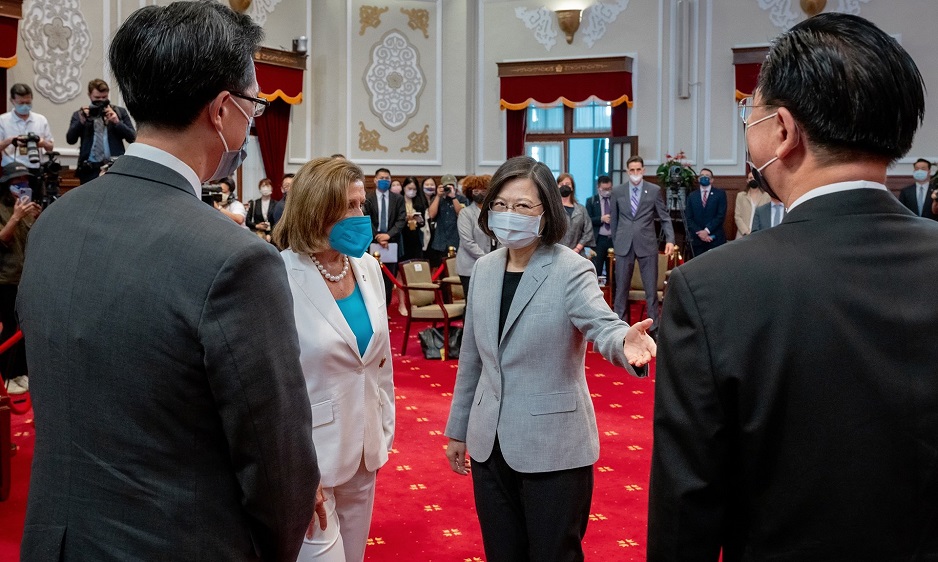
The visit to Taiwan by a US congressional delegation led by
Speaker of the House of Representatives Nancy Pelosi has once again pushed the Taiwan Strait to the front of international attention. It shows Taiwan’s role as a metaphor for fundamental questions about the nature of the international system and whether, for all its aspirations to peace and human progress, it is ultimately a system wrought by the hard power of states, whether China’s or the US’s, in their interests.
These strategic questions about the place of Taiwan in the world have, however, been quickly overtaken by the tactical actions by both Beijing and Washington around the visit. Beijing has
enacted economic sanctions against Taiwan and the People’s Liberation Army is conducting four days of
military exercises in six locations around the island. Like the PLA’s missile tests in 1995 and 1996, these will have far-reaching consequences for the future of cross-strait relations, US–China relations and Taiwan’s future. None of these actions take Taiwan closer to Beijing’s existential goal of unification.
There’s a reasonable case to be made that both Beijing and Washington have mishandled the visit. Washington failed to communicate clearly and coherently on its purpose, such as whether it was a response to PLA Air Force flights into the Taiwan Strait that are undermining the US–China normalisation agreements reached in the 1970s and 1980s. It has also failed to mobilise
consistent messaging from US allies in the region. The vacuum has been filled with
furious rhetoric from Beijing and left the US isolated. Beijing, meanwhile, chose to escalate the implications of the visit in its official responses, possibly with an eye on the Chinese Communist Party congress at the end of the year, creating circumstances in which neither the US nor Beijing could back down.
As has been typical over the past several years, the wisest moves have come from Taipei, which with very measured and discrete responses welcomed the visit but did not add to any escalation.
The Taiwan side also offered an interesting itinerary. Pelosi
addressed the Taiwanese legislature and
met with President Tsai Ing-wen, as would be expected, but also visited the
National Human Rights Museum in Jingmei in the south of Taipei. This museum is the site of a former prison complex where, over the decades of authoritarian rule in Taiwan, thousands of political prisoners were detained and tried in military courts. Some of Taiwan’s most famous dissidents passed through the prison, including the leaders of the human rights protest in 1979 known as the Kaohsiung incident. The so-called Kaohsiung eight went on to become key figures in Taiwan’s democratisation in the late 1980s and 1990s. Pelosi’s visit to the museum was led by Chen Chu, one of the eight, who was mayor of Kaohsiung from 2006 to 2018 and is now chair of the National Human Rights Commission and president of the Control Yuan, the oversight branch of the government.
The prison complex became a memorial site in 2007 and in 2018 was placed under the administration of the National Human Rights Museum. It is a symbol not just of Taiwan’s struggle for democracy but also of the long process of truth and reconciliation in the years after the formal realisation of democracy in the late 1980s. The museum demonstrates the process in which the political dissent that was once a life-risking stand against an authoritarian state becomes part of political history and the social fabric through the institutionalisation of memory. It is the power of democracy that makes this possible, taking the trauma and injustice of the past and creating institutional mechanisms for public reflection and understanding that can be difficult and divisive but ultimately offer a lasting guide to a society’s progress into the future.
This journey for Taiwan is in sharp contrast to China’s, where history remains an instrument of CCP power. It offers lessons to a democracy like Australia that is wrestling with how to address its history of colonial violence with its own institutionalisation processes. The Taiwanese have much to teach Australians if we take the time to learn.
It also illustrates what is at stake for the people of Taiwan. If Taiwan fell under the authority of Beijing, the National Human Rights Museum and numerous other democratic institutions and forms of social and cultural expression through which the Taiwanese are coming to terms with their history would not continue. The People’s Republic of China’s ambassador to France, Lu Shaye, stated this starkly in an
interview on French television about Pelosi’s visit. He said, ‘After reunification, we will do re-education’, a grotesque suggestion that what China scholar Louisa Lim has called the
People’s Republic of Amnesia will attempt to force 24 million people to forget a century of social, economic and political progress.
Foreign and security policy is focused on the actions of states and is less interested in peoples and their stories. The PLA military exercises will generate serious geopolitical consequences that will require thoroughgoing policy assessment around the world. But Pelosi’s visit should serve to highlight the meaning of the Taiwanese story and the consequences of losing the lessons it offers countries like Australia about the pathways to make better societies.
 Print This Post
Print This Post